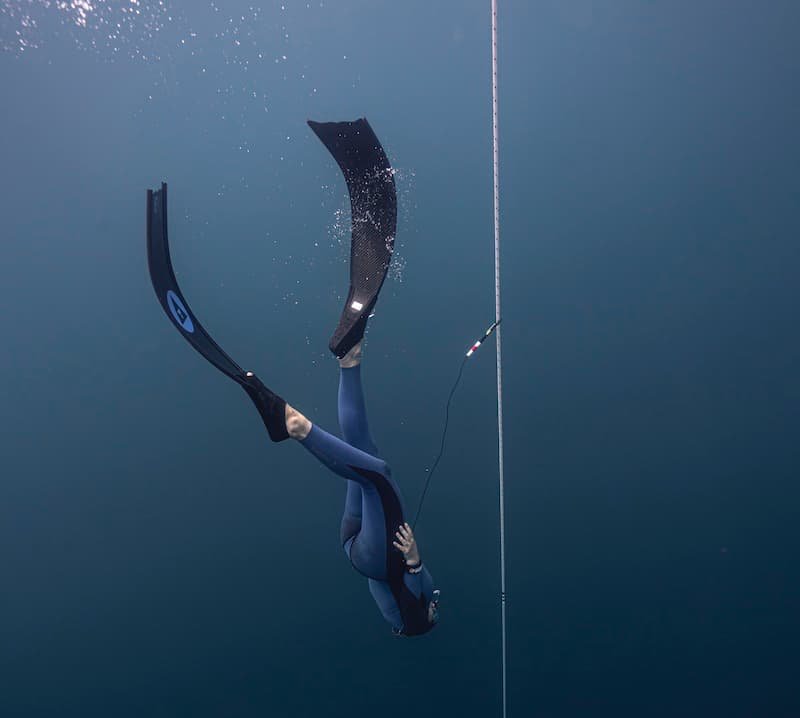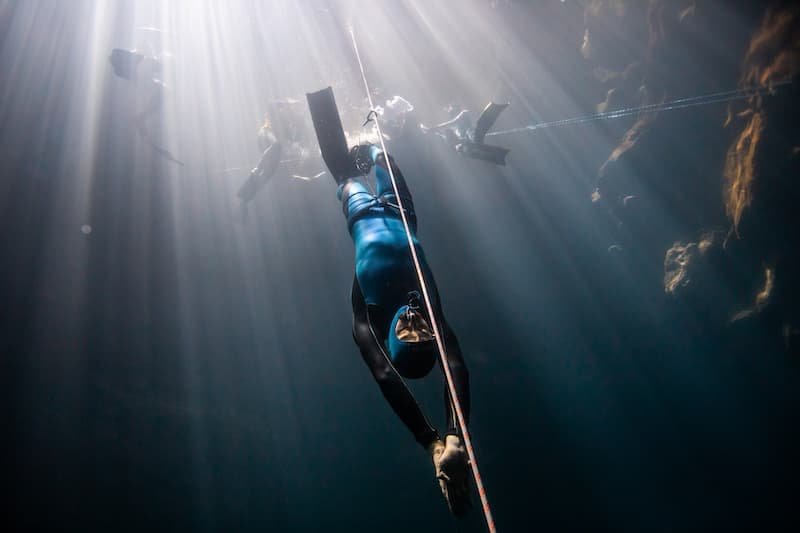
 Katie Wood
Freediver, Writer, Explorer
Katie Wood
Freediver, Writer, Explorer

 Katie Wood
Freediver, Writer, Explorer
Katie Wood
Freediver, Writer, Explorer
In the ever-changing landscape of our oceans, sustainability has become more than just a buzzword; it’s a responsibility for everyone, especially those who explore beneath the waves. As freedivers, we are uniquely positioned to connect with the underwater world, witnessing its beauty and fragility firsthand. By educating the next generation of divers about sustainability, we can foster a community of ocean advocates who actively work to protect the environments they cherish.
Freedivers rely on the health of the oceans for their sport and well-being. Coral reefs, marine life, and clear waters are essential components of a thriving underwater ecosystem. However, threats like climate change, overfishing, and pollution are jeopardizing these natural wonders. Teaching sustainability ensures that new divers understand the importance of their role in preserving the marine environment for future generations.
The first step in educating new divers about sustainability is fostering an understanding of the marine environment's complexity and vulnerability. Beneath the waves lies an interconnected web of ecosystems, where each species plays a critical role. Coral reefs, often referred to as the “rainforests of the sea,” are a prime example. These vibrant underwater structures support approximately 25% of all marine life, yet they are highly sensitive to temperature changes, pollution, and physical damage.
Freedivers often explore these environments, witnessing firsthand the challenges they face. Seeing coral bleaching, plastic pollution, or dwindling fish populations can be eye-opening. However, without proper education, many new divers may not fully grasp the implications of these issues. By integrating marine biology basics into freediving training, we can teach divers about the roles species play within ecosystems, the importance of biodiversity, and the consequences of environmental degradation. Understanding how their actions impact these delicate systems empowers divers to make more informed and conscientious decisions.

Sustainable diving begins with responsible behaviors underwater. Every action a freediver takes can have a ripple effect on the marine environment, and instilling these habits early is crucial. Proper buoyancy control, for instance, is essential to avoid unintended contact with fragile coral reefs or the seabed. Freedivers should also learn to identify signs of stress in marine wildlife and ensure that their presence doesn’t disturb natural behaviors.
Encouraging freedivers to adopt a hands-off approach is vital. Touching marine animals or corals can harm them, and feeding wildlife disrupts their natural feeding patterns. Similarly, teaching divers to avoid collecting shells, corals, or other natural materials ensures these items remain part of the ecosystem. By emphasizing respect for marine life, we create divers who act as protectors rather than disruptors.
Freediving courses should also address the impact of gear and equipment. For example, divers should ensure their equipment is securely attached to prevent it from becoming debris, and they should use eco-friendly sunscreens to avoid introducing harmful chemicals into the water. By adopting a mindset of leaving no trace, freedivers contribute to the preservation of the underwater world.
Beyond adopting sustainable practices during dives, freedivers can play an active role in marine conservation. Education programs should highlight opportunities to contribute, from participating in beach and underwater cleanups to engaging in citizen science projects. Freedivers are often the first to observe changes in marine environments, making them valuable contributors to scientific research. For instance, divers can report coral bleaching events, track marine life populations, or document the presence of invasive species.
Programs like Reef Check and Project AWARE provide structured ways for divers to get involved. By collecting data and sharing observations, divers not only contribute to conservation efforts but also deepen their understanding of the environments they explore. These activities are particularly effective in fostering a sense of stewardship among young divers, encouraging them to view themselves as guardians of the ocean.
While freediving is often considered a low-impact activity compared to other water sports, it is not without its environmental footprint. Travel, gear production, and even day-to-day practices can contribute to environmental degradation. Educating divers about ways to minimize their carbon footprint is an important aspect of sustainability.
One approach is promoting local diving. While international trips to exotic locations are appealing, diving closer to home reduces the emissions associated with air travel. If travel is necessary, freedivers can offset their carbon footprint by supporting reforestation projects or choosing eco-certified accommodations and dive operators.
The choice of gear also matters. Divers can be encouraged to invest in high-quality equipment designed for durability, reducing the need for frequent replacements. Additionally, some manufacturers, like Alchemy, are incorporating sustainable practices into their production processes, such as using renewable energy and eco-friendly materials. Educating divers about these options empowers them to make environmentally conscious purchasing decisions.
Freediving has a unique ability to inspire awe and wonder. Many divers describe their experiences underwater as life-changing, and this emotional connection can be a powerful tool for advocacy. Educating divers to share their stories through social media, photography, or writing can amplify the message of ocean conservation.
Sponsored athletes, instructors, and dive influencers play a crucial role in this. By showcasing the beauty of the underwater world alongside the challenges it faces, they can motivate others to take action. Stories of personal encounters with marine life, discoveries of hidden ecosystems, or the impact of conservation efforts can resonate deeply with audiences, creating a ripple effect of awareness and inspiration.
Freedivers should also be encouraged to support and promote conservation initiatives within their local communities. Hosting workshops, organizing cleanups, or collaborating with schools and organizations to educate others can help spread the message of sustainability far and wide.
Freediving schools and organizations have a unique opportunity to embed sustainability into their teaching philosophies. By integrating environmental education into their curricula, they can ensure that every new diver enters the water with a sense of responsibility. Courses can include modules on marine ecology, conservation challenges, and the role of divers in protecting the ocean.
Partnerships with conservation organizations can also enhance educational efforts. For example, dive centers can collaborate with nonprofits to offer joint programs or host events that raise awareness about ocean issues. Additionally, freediving competitions and events can incorporate sustainability initiatives, such as waste reduction measures or fundraising for marine conservation.
By leading by example, freediving schools can set the standard for sustainable diving practices. Their influence can extend beyond individual divers, shaping the broader diving community’s culture and values.
Educating the next generation of divers about sustainability is not just about protecting the ocean today; it’s about creating a lasting legacy. Divers who understand and value sustainability are more likely to pass these principles on to others, creating a ripple effect that extends far beyond the diving community.
The impact of these efforts can be profound. By fostering a generation of divers who are passionate about conservation, we can ensure continued support for marine protected areas, stronger advocacy for policies that address climate change, and increased public awareness of ocean issues. This collective effort can help turn the tide in the fight to protect our seas.

The health of our oceans is at a tipping point, and the actions we take today will shape their future. Freedivers have a unique perspective and a powerful platform to drive change. By educating the next generation about sustainability, we can empower divers to become champions for the ocean, inspiring others to follow their lead.
Freediving is more than a sport—it’s a connection to the natural world. By combining this connection with a commitment to sustainability, we can ensure that the underwater wonders we cherish today remain vibrant and thriving for generations to come. Whether through responsible diving practices, active conservation efforts, or inspiring advocacy, every diver has the potential to make a difference. Together, we can create a legacy of stewardship and ensure that the ocean’s beauty and vitality endure.